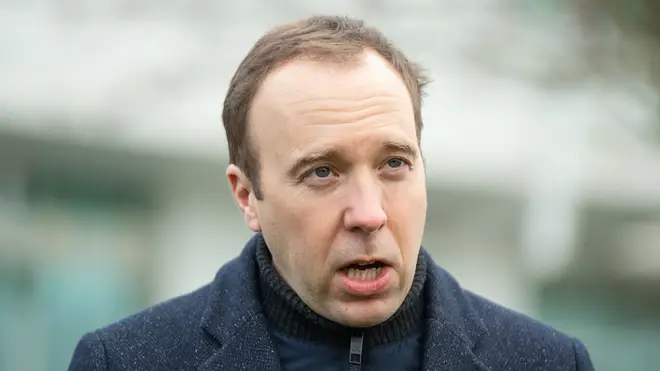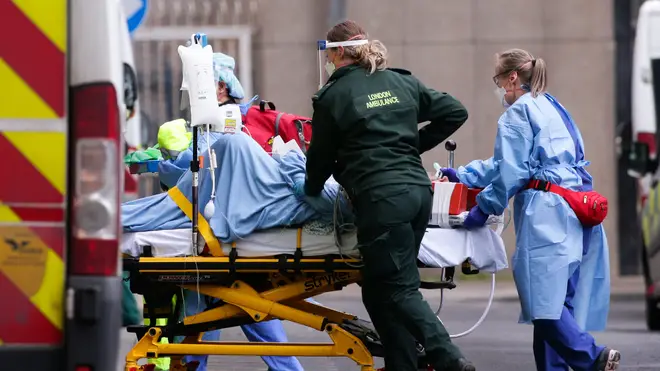
Shelagh Fogarty 1pm - 4pm
13 January 2021, 08:20 | Updated: 13 January 2021, 08:57

Health Secretary Matt Hancock has said it is "impossible to know" how long Covid restrictions in England will last as cases continue to rise across the country.
Mr Hancock has said coronavirus lockdown restrictions will remain in place in England for as "long as they are necessary".
He also said the vaccination programme was "on track" to deliver the jab to the 14 million most vulnerable people by February 15.
However, he told Sky News that it was "impossible to know" when restrictions could be eased.
"We will keep the restrictions in place not a moment longer than they are necessary, but we will keep them in place as long as they are necessary," he said.
"These measures that we have got in place that we hope to be able to lift, and we should be able to lift when we have been able to protect through vaccination those who are vulnerable - right now the vaccination is not in a position to do that."

On Tuesday, UK coronavirus deaths rose by 1,243, the second-highest number of fatalities recorded in a single day.
This brings the total number of deaths within 28 days of a positive test to 83,203.
Cases have also risen, today by 45,533 bringing the total since the start of the pandemic to 3,164,051.
Hospitalisations are also on the rise, and Home Secretary Priti Patel said there has been a 22% increase in patients who are receiving care from last week.
There are now 35,075 people currently in hospital with Covid-19.
In grim statistics which lay bare the true toll of the effect this virus is having, the Office for National Statistics (ONS) said almost half of all deaths in hospital in the last week of 2020 were linked to Covid-19.
Of the 4,956 deaths registered which occurred in hospitals, 47.7% involved coronavirus, up from 40.2% the previous week.

Home Secretary: These numbers are horrifying
Strict measures have been introduced in England in an attempt to curb the rapidly rising cases.
Almost 45,000 fixed penalty notices for breaking Covid rules have so far been issued in the UK, as a police chief said forces "make no apology" for doing so.
Martin Hewitt, Chair of the National Police Chiefs' Council, added those who flout Covid rules are: "Dangerous, selfish, and totally irresponsible".
He added that forces across the country have been attending a number of illegal gatherings, including a party of 40 people - each of whom had paid £40 to attend - and issued at £10,000 fine to an organiser who claimed a house party was a business meeting.
Mr Hewitt told a Downing Street press conference people needed to take personal responsibility for their actions.

Chief Constable makes "no apology" for police issuing almost 45,000 fixed penalty notices
The Health Secretary also said the NHS is considering plans to move some patients into hotels to ease pressure on hospitals.
Mr Hancock said: "There are huge pressures on the NHS and we are looking to all different ways that we can relieve those pressures.
"We would only ever do that if it was clinically the right thing for somebody. In some cases, people need sit-down care, they don't actually need to be in hospital bed.
"It isn't a concrete proposal by any means but it is something that we look at as we look at all contingencies."
Asked if the NHS could end up overwhelmed, Mr Hancock said: "We're going to do everything we possibly can to give the NHS the support, the resources it needs.
"That includes, for instance, opening the Nightingale hospitals and the London Nightingale hospital is now receiving patients for the first time since April."
He said sending some patients to hotels was a "further back-up plan" only done if appropriate for the patient but "it's not something we are actively putting in place".
He said it would be for "step-down" patients only.
On vaccinating people 24/7, he said: "We're absolutely up for doing that if it helps to speed up the vaccination programme.
"I can't see that being the major factor, because most people want to get vaccinated in the daytime, and also most people who are doing the vaccinations want to give them in the daytime, but there may be circumstances in which that would help.
"We're absolutely up for that."